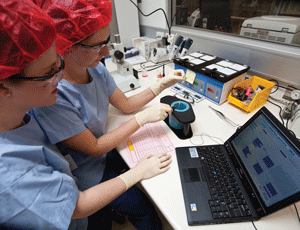Yammer experiment bears fruit at Genea

New enterprise social tools such as Yammer have been promoted as a way to transform knowledge management and information sharing in organisations. To find out whether this is truly the case, IDM took a look at one leading Australian healthcare and research organisations to find out.
Yammer is now reportedly being used by over 90,000 companies and organisations across the globe, including some high profile users in Australia such as AMP and Deloittes.
It is delivering results for researchers, clinicians and nurses at Genea, an Australian company at the forefront of assisting and researching human fertility.
Formerly known as Sydney IVF, before a name change late last year, Genea has over 15 clinics located across metropolitan Sydney, various regional centres in New South Wales, and the ACT.
In addition to providing Australians with assisted conception since 1985, Genea has teams of researchers working in the fields of IVF and genetics. It holds nine of the 10 licenses issued in Australia for stem cell research .
There are more than 300 staff across Genea that have had access to Yammer for the past 12 months as part of an official trial.
Kate Carruthers, Digital Community Manager at Genea, said the organisation has been trying hard to to get away from the traditional paradigm of sending email to share information that needs to be disseminated more broadly.
“Our staff profile is typically scientists, researchers or nurses who need to be aware of the latest updates to science.
“Scientific research is very important to us, and it is vital that key knowledge around the latest scientific and patient care can be acquired, transferred and retained.”
Research information comes from a wide variety of sources, such as scientific journals, professional associations and conference proceedings.
“The science and techniques are constantly changing,” said Carruthers.
“The advantage of Yammer is that conversation about important new research is shared among everyone in the organisation, its not just an email exchange or a private conversation over a coffee somewhere.”
“Managing scientific collaboration is really important and sharing that information with clinical staff who service our patients.”
In collaboration with Learning & Development Specialist Alexandra Lederer, Carruthers has been working to implement Yammer as a self-service knowledge management portal.
“We need to have it so that staff can share knowledge themselves, there’s only two of us we cant be a bottleneck.”
Uptake has not been immediate or universal, but there is now a small group of early adopters that have taken a shine to Yammer, and are leading the way for the organisation
Genea is a standard Microsoft shop, running Outlook and Exchange email, Office applications and SharePoint 20007. An intranet runs on the the Australian Elcom .Net platform
“60% of our learning is knowledge sharing,” notes Alexandra Lederer, “We need to make sure that we are not creating silos of knowledge in the organisation.”
“Our staff are located in different locations, and some of our advanced researchers are tucked away in labs where its not easy to spend any face to face time.
“Yammer also helping many of pour part-timers and staff who work from home to join in on the conversation.”
One of the advantages of Yammer is its familiarity, as it offers pretty much the same functionality as a combination of FaceBook and Twitter.
“Its very intuitive if you’ve already used FaceBook, which an enormous number of our staff already do,” said Carruthers.
“Yammer offers It doesn’t try to do any more than that. It takes a metaphor that people are already used to with FaceBook so you don’t need to train users.
“The Microsoft messaging platform is not as user friendly. We are on SharePoint 2007 but we did a review of 2010 and Microsoft still hasn’t separated content from presentation which does make it a challenge to use it as an effective content management solution.’
Yammer is offered in a couple of different versions, from an entry level “Freemium” edition to a fully paid license at around $US5 per annum per user, although enterprise packages are able to be negotiated.
“If you want all the bells and whistles you need to pay for them,” recommends Carrutthers.
Having the premium edition also means having access to all of the data and conversations hosted on Yammer, something very important to a medical research organisation with tough industry regulations to keep in mind.
Currently Yammer is not integrated with Genea’s enterprise architecture, although now the deployment has moved out of the trial phase it will look to mesh with Active Directory and SharePoint.
Genea initially though of Yammer as a tactical tool, but based on analysis of how its used been used during the 2011 trial, and how it potentially can be used, the organisation is now really starting to see it as a strategic internal communications tool.
In addition too boosting knowledge sharing, it is also planned to begin supporting core business processes, initially playing a role with Humane Resources and staff onboarding
Genea is presenting on of the industry case studies at the annual KM Australia conference, being held in Sydney from July 24-26, 2012. http://www.kmaustralia.com/
